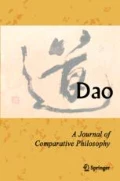Abstract
This essay looks into a particular aspect of Sinological challenge to the modern project of Chinese philosophy within the Western academy through the lens of authorship, using the Zhuangzi 莊子 as a case study. It explores philosophical implications for texts whose authorship is in doubt and develops a new heuristic model of authorship and textuality, so that a more robust intellectual space for the philosophical discourse on Chinese classics can be carved out from the dominant historicist Sinological discourse. It argues that philosophical and Sinological approaches to Chinese classics have divergent scholarly objectives and follow different disciplinary norms. To clarify such divergence, it proposes a heuristic model to distinguish two sets of scholarly objects operative in Sinology and philosophy respectively, namely original text versus inherited text, historical author versus textual author, and authorial intent versus textual intent. These two sets of scholarly objects are related, at times overlapping but often irreducibly distinct, with the former in the pairs belonging to Sinologists and the latter to philosophers.
Similar content being viewed by others
References
Coutinho, Steve. 2004. Zhuangzi and Early Chinese Philosophy: Vagueness, Transformation and Paradox. Burlington, VT: Ashgate.
Defoort, Carine. 2001. “Is There Such a Thing as Chinese Philosophy? Arguments of an Implicit Debate.” Philosophy East & West 51.3: 393–413.
____. 2006. “Is ‘Chinese Philosophy’ a Proper Name? A Response to Rein Raud.” Philosophy East & West 56.4: 625–660.
Foucault, Michel. 1998. “What is an Author?” In Aesthetics, Method, and Epistemology, edited by James D. Faubion and trans. by Robert Hurley et al. New York: The New Press.
Ge, Zhaoguang 葛兆光. 2001. “Dressed in Unfitted Suits: The Debate on the Definitions of Chinese Philosophy and Confucianism 穿一件不合尺寸的衣衫——關於中國哲學和儒教定義的爭論.” Open Times 開放時代, November issue. http://www.acriticism.org/article.asp?Newsid=2750&type=1001 (last access 2 November, 2015).
Graham, A. C. 1986. “How Much of the Chuang Tzǔ Did Chuang Tzǔ Write?” In Studies in Chinese Philosophy and Philosophical Literature. Albany: SUNY Press.
____. 2001. Chuang-Tzu: The Inner Chapters. Indianapolis, IN: Hackett.
Huang, Yong. 2010. “Respecting Different Ways of Life: A Daoist Ethics of Virtue in the Zhuangzi.” The Journal of Asian Studies 69.4: 1049–1069.
Klein, Esther. 2011. “Were There ‘Inner Chapters’ in the Warring States? A New Examination of Evidence about the Zhuangzi.” T’oung Pao 96: 299–369.
Lewis, Mark. 1999. Writing and Authority in Early China. Albany: SUNY Press.
Liu, Xiaogan. 1994. Classifying the Zhuangzi Chapters. Trans. by William Savage. Ann Arbor: University of Michigan Press.
____ 劉笑敢. 2007. “From Exegesis to Construction: Two Orientations, Two Standards 從注釋到創構: 兩種定向, 兩個標準.” Nanjing University Journal 南京大學學報 3: 90–102.
____. 2008. “Between Two Orientations 掙扎遊走於兩種定向之間.” Journal of Chinese Philosophy and Culture 中國哲學與文化 3: 108–132.
Makeham, John, ed. 2012. Learning to Emulate the Wise: The Genesis of Chinese Philosophy as an Academic Discipline in Twentieth-Century China. Hong Kong: The Chinese University Press.
Nylan, Michael. 2013. “Chinese Tradition and Modernity: Review of Tongdong Bai’s China: The Political Philosophy of the Middle Kingdom (London: Zed Books, 2012. Pp. 177.).” Review of Politics 75.4: 677–679.
Ouyang, Min. 2012. “There is No Need for Zhongguo Zhexue to be Philosophy.” Asian Philosophy 22.3: 199–223.
Raud, Rein. 2006. “Philosophies versus Philosophy: In Defense of a Flexible Definition.” Philosophy East & West 56.4: 618–625.
____. 2014. “What is Japanese about Japanese Philosophy?” Paper presented in the conference “Opening up Tetsugaku: The Making of the Journal of Japanese Philosophy,” University of Tokyo, January 10, 2014. https://www.academia.edu/6790886/What_is_Japanese_about_Japanese_Philosophy (last access August 1, 2014).
Wimsatt, W. K., Jr., and M. C. Beardsley. 1946. “The Intentional Fallacy.” The Sewanee Review 54.3: 468–488.
Author information
Authors and Affiliations
Corresponding author
Rights and permissions
About this article
Cite this article
Jiang, T. The Problem of Authorship and the Project of Chinese Philosophy: Zhuang Zhou and the Zhuangzi between Sinology and Philosophy in the Western Academy . Dao 15, 35–55 (2016). https://doi.org/10.1007/s11712-015-9473-7
Published:
Issue Date:
DOI: https://doi.org/10.1007/s11712-015-9473-7




